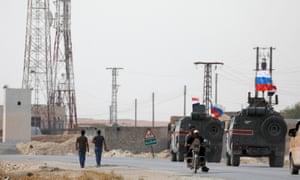Extract from The Guardian
Syria
Syria
Soldiers’ presence underlines Moscow’s role as power broker after evacuation of US personnel
Russian units have begun patrolling territory separating
Turkish-backed Syrian rebels from the Syrian army around the flashpoint
town of Manbij in north-east Syria, in a clear sign that Moscow has become the de facto power broker in the region after the evacuation of US troops.
Oleg Blokhin, a Russian journalist usually attached to mercenaries in Syria, posted a video on social media on Tuesday from a deserted US military base in the village of al-Saadiya, near Manbij.
“They [the US] were here yesterday, we are here today,” he said. “Now we’ll see how they were living and what they were doing.”
Oleg Blokhin, a Russian journalist usually attached to mercenaries in Syria, posted a video on social media on Tuesday from a deserted US military base in the village of al-Saadiya, near Manbij.
“They [the US] were here yesterday, we are here today,” he said. “Now we’ll see how they were living and what they were doing.”
Meanwhile, the flag of the Syrian regime was raised above Manbij for the first time in years, Syrian state media reported, after Kurdish officials agreed a deal with their former opponents to protect both the contested town and nearby Kobane e from a six-day-old Turkish assault.
Regime troops entered Manbij on Monday night, while at the same time Syrian rebel proxies loyal to Turkey massed to the west ahead of a planned attack.
The strategically located town of Manbij, a US base for three years, remains a major military target for Turkey, its president, Recep Tayyip Erdoğan, said on Tuesday. Shelling between Turkish proxy Syrian rebel forces and Kurdish-led Syrian Democratic Forces (SDF) positions continued at intervals throughout the day, although there have been no reports yet of fighting inside the city itself.
Moscow’s special envoy to Syria, Alexander Lavrentyev, said on Tuesday Russia opposed the Turkish operation and would not allow direct clashes between Nato member Turkey’s troops and Syrian forces. The two sides stopped short of a direct confrontation when Ankara first put boots on the ground in Syria in 2016 to seize the area around Jarablus from Isis, in the process hampering the expansion of the SDF.
“[Fighting between Turkey and Syria] would simply be unacceptable … And therefore we will not allow it, of course,” he said during a visit to the United Arab Emirates, adding that Turkey and the Assad regime were in direct contact – a major reversal since the early years of Syria’s war, in which Ankara backed calls for Assad’s removal.
The sweeping changes across north-east Syria were triggered by Donald Trump’s announcement last week that US troops would withdraw, in effect green-lighting a Turkish offensive on the SDF, which Ankara has long maintained is an offshoot of the militant Kurdistan Workers’ party (PKK).
The SDF was America’s ground partner in the five-year campaign against Isis, and lost 11,000 troops in the long battle. Donald Trump has attempted to rebut accusations even from his most loyal supporters that the move amounted to a betrayal.
Despite the prospect of losing the area’s semi-autonomous status, Kurdish officials struck a Russian-brokered deal with Damascus on Sunday for reinforcements to protect Kurdish-held border positions. There are unconfirmed reports that talks are still under way to implement a Russian-enforced no-fly zone over the area.
Syrian state media showed residents cheering the arrival of troops loyal to Bashar al-Assad in Manbij and Ain Issa, waving flags and throwing rice before the path of soldiers. The regime flag was also briefly raised above the famous clocktower square in Islamic State’s former capital of Raqqa on Monday night, a source in the city said, before it was taken down again by the SDF.
Heavy fighting in the border towns of Tel Abyad and Ras al-Ayn as well as airstrikes and shelling of other Kurdish-controlled roads and towns has displaced 160,000 people from their homes and killed at least 165 civilians. SDF counterattacks over the border have left 20 Turkish civilians dead, including a Syrian baby.
The offensive has been widely condemned for precipitating a humanitarian crisis and risking the return of Isis, after about 750 people with links to the militant group took advantage of the chaos on Sunday to escape a Kurdish-run detention camp. Footage of Syrian rebel proxies summarily executing nine Kurdish civilians on a major highway have also prompted allegations of war crimes.


No comments:
Post a Comment